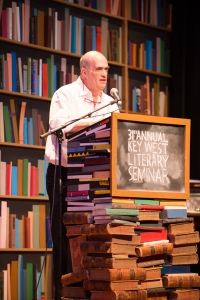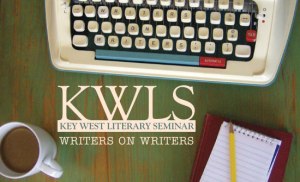Key West Literary Seminar: Session 1 download
 Session 1 of this year's Key West Literary Seminar wrapped up yesterday. If you missed it, I suspect recordings will be showing up soonish on the Seminar's audio archive site. And we're getting particularly good coverage this year on Littoral, the Seminar blog and from WLRN, the public radio station in Miami. If you're Twitter-inclined, check out the hashtag #kwls -- you'll even see eminences like Judy Blume and James Gleick chiming in along with us lesser mortals in the audience. This year is not as Twitterific as last but we don't have William Gibson and Margaret Atwood with us (though Gibson is scheduled to return next year -- don't wait too long to sign up for 2014's Seminar, The Dark Side, because it's selling fast). As has quickly become tradition, Jason Rowan is back making custom-crafted cocktails, tailored to the year's theme. Keep an eye on his blog, Embury Cocktails, for recipes and more information in the near future.
Session 1 of this year's Key West Literary Seminar wrapped up yesterday. If you missed it, I suspect recordings will be showing up soonish on the Seminar's audio archive site. And we're getting particularly good coverage this year on Littoral, the Seminar blog and from WLRN, the public radio station in Miami. If you're Twitter-inclined, check out the hashtag #kwls -- you'll even see eminences like Judy Blume and James Gleick chiming in along with us lesser mortals in the audience. This year is not as Twitterific as last but we don't have William Gibson and Margaret Atwood with us (though Gibson is scheduled to return next year -- don't wait too long to sign up for 2014's Seminar, The Dark Side, because it's selling fast). As has quickly become tradition, Jason Rowan is back making custom-crafted cocktails, tailored to the year's theme. Keep an eye on his blog, Embury Cocktails, for recipes and more information in the near future.
Phyllis Rose opened with a wonderful keynote address Thursday night, examining John Hersey (for whom the Thursday event is named) as a lens through which to view the whole writer vs. person question. Is the man Key Westers saw riding his bike around the island the same person who wrote "Hiroshima" and "A Bell for Adano"? The answer is, of course, no and yes. Rose was also refreshingly dismissive about the overwhelming adoption of deconstruction and other French-influenced critical approaches toward literature, which tortured those of us who were English majors in the latter part of the 20th century and dared to think that writers' lives and times might influence their work. For literary scholars who didn't feel like sacrificing themselves on the altars of Derrida and Foucault, literary biography became "a welcome oasis during the desert years of deconstruction," Rose said. "Writers about writers were rescued by readers who wanted to know about writers' lives."
A sporadic sample from the rest of the weekend:
From Judith Thurman, biographer of Isak Dinesen and Colette and staff writer for The New Yorker:
- "Fiction is high-minded betrayal and biography is dirty-minded fidelity."
- One of Thurman's early jobs was translating pornographic movies. "It's freelance work that I heartily recommend because it's easy -- you just have to understand the words 'Yes.... yes!' and 'More!'"
- Translation is "yoga for the mind and for the ear."
- "One definition of the truth is that which is untranslatable."
From Brenda Wineapple, biographer of Nathaniel Hawthorne and Gertrude and Leo Stein, author of a book about Emily Dickinson and Thomas Wentworth Higginson:
- On her subjects: "I prefer them deader and deader."
- Emily Dickinson is "the elusive subject par excellence."
- Oscar Wilde quote: "Biography adds new terror to death."
Most amazing fact learned at this year's Seminar (so far):
- Bram Stoker based the character of Dracula on Walt Whitman (amazing fact supplier: Mark Doty). Edmund White followed this with a comment on why vampire is so often code for gay in literature: "You meet someone, you kiss them and you turn them into you."
More from Edmund White, biographer of Genet and Proust, literary critic and author of a biographical novel on Stephen Crane:
- "Politics and literature are opposites. Politics are all lying and literature is all truth-telling."
- "Having come out when I was 12, I've always wondered what it would be like to be closeted."
- On fiction vs. nonfiction: "The contract with the reader is entirely different." That's why he calls the books about his life autobiographical novels, not memoirs. "Once they're called novels, you're free to do whatever you want."
From Jay Parini, biographer of William Faulkner, Robert Frost and John Steinbeck and author of biographical novels on Melville and Tolstoy:
- Leon Edel's five-volume biography of Henry James is "better than Xanax" as a treatment for insomnia. "He's the Xanax of all writers."
- On the difference between writing biographies of Jesus (his most recent subject) and Gore Vidal (his next subject): "At least Jesus didn't think he was Gore Vidal."
- "Biography is a form of fiction. .... I love to read biographies, even bad ones."
- In writing biography, "you're not presenting a life. You've giving an illusion of a life."
- To Edmund White: "I read your biography of Genet. I thought it was a great novel."
Literary subjects that KWLS panelists attempted as grade-schoolers:
- Phyllis Rose: Eleanor Roosevelt, after her mother rejected her earlier choice of the Duchess of Windsor as a suitable subject for an assignment to write about "an admirable woman."
- Edmund White: Peter the Great. "I was absolutely power-mad as a child."
- Brenda Wineapple, at 10 years old, wrote the first chapter of a novel and gave it to her father, whose response was "But there's no plot here." Wineapple: "My career as a novelist was over."
Books I have purchased (so far):
- The Master by Colm Toibin
- Promised Land: Thirteen Books That Changed America by Jay Parini
- Footsteps: Adventures of a Romantic Biographer by Richard Holmes, who isn't at the Seminar but the book was mentioned several times
If all of this makes you eager to sign up for Session 2, it's not too late. It all starts again Thursday night with a keynote I'm really looking forward to: Colm Toibin talking about Elizabeth Bishop. That's Toibin in the photo, by the way, speaking at the podium that Cayman Smith-Martin and his crew built from books they got from us here at the library -- they were otherwise destined for the recycling plant so it's great to see them serving literature one last time.



